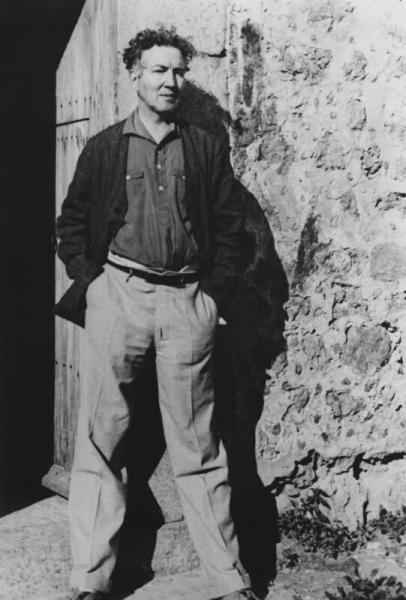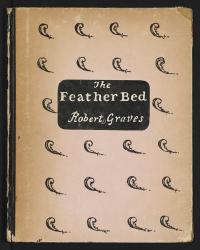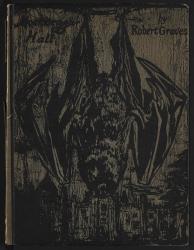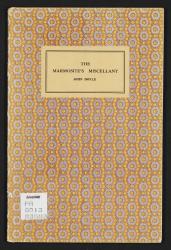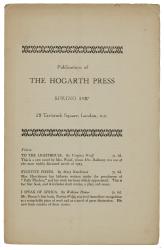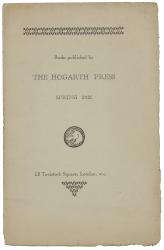Robert Graves
Biography
Authored By: James Lawes
Edited By: N/A
Robert von Ranke Graves (1895–1985) was a poet, lecturer and novelist born in Wimbledon on July 24th 1895 to Alfred Perceval Graves (1846–1931) and Amalie Elizabeth Sophie (1857–1951). His father was a minor Irish poet and Gaelic scholar and his mother a relation to Leopold von Ranke, eminent historian and founder of modern source-based history. This domestic literary environment influenced Graves, who cultivated a fascination with mythology, which later led him to translation and analysis of ancient Greek texts. He is also now known as a classicist and mythographer.
Graves attended a dame-school followed by a number of preparatory schools after which he won a scholarship in 1909 to Charterhouse. He was an athletic youth, exceling at boxing and rock climbing. It was at Charterhouse that he made his first early literary attempts, poetry quickly gaining favour over his other pursuits. This new passion was encouraged by his tutor George Mallory and subsequently by his friendship with G. H. ‘Peter’ Johnstone, a relationship later described by Graves as pseudo-homosexual.
In 1914 during his final year at Charterhouse, Graves was offered a classical exhibition at St John’s College, Oxford which he was preparing to accept when he was brought out of his convinced pacifism by the German contravention of Belgian neutrality during the outbreak of the First World War. It was this period of his life that defined Graves’ poetry and led to the production of some of his most famous work. He was commissioned into the Royal Welch Fusiliers where he befriended fellow poet Siegfried Sassoon. Graves’ first episode of active duty came to an end after the 1916 battle of the Somme during which he sustained a shell fragment injury to his lung whilst leading his men through a cemetery at Bazentin-le-petit church. The severity of his situation caused him to be left for dead. Graves recovered in time to read his own obituary in The Times.[1]
Graves completed the first of his poetry collections Over the Brazier (1916) during his time convalescing back in Britain and a second Faeries and Fusiliers (1917), documenting trench life and the intensity of his and Sassoon’s friendship, followed shortly after. Graves suffered from shell-shock and was admitted to hospital in 1917 where he became attracted to a young nurse. This and a growing revulsion for Peter Johnstone who had recently been convicted of making homosexual advances led to an emotional shift in Graves’ poetry. He fell in love with Annie Mary Pryde (Nancy Nicholson; 1899–1977), the first of his many muses.
The end of Graves’ military career occurred in 1918 when he found himself stricken with Spanish influenza whilst stationed in Limerick, Ireland. Seeking an English hospital, he abandoned his post, which was an act worthy of a desertion charge. Fortuitously, Graves arrived at Waterloo and happened to share a taxi with a demobilisation officer also returning from Ireland, who completed his papers using the necessary secret codes.[2] The poet then married Nancy Nicholson on 23rd January 1918 and they moved to Oxfordshire where Graves eventually began reading English at St John’s.
From here Graves and Nancy’s lives became fraught with difficulty. The poet’s nerves were still weak from recurring bouts of shell-shock and the poor reception of his third poetry collection Country Sentiment (1920). Nancy meanwhile gave birth to four children in five years and failed to earn money from her shop-keeping venture. They had to borrow money from family and friends (including T.E. Lawrence and Edmund Blunden). The stress caused Graves to abandon his undergraduate study.
Virginia Woolf writes of Graves in an entry to her diary on the 27th of April 1925, by which time Virginia and Leonard Woolf had already published The Feather Bed (1923) at the Hogarth Press. In the short entry she reports a chance encounter with the poet when he arrives unannounced at the doorstep of his publishers. Woolf seems underwhelmed: “No I don’t think he’ll write great poetry: but what will you? The sensitive are needed too; the halfbaked, stammering stuttering, who perhaps improve their own quarter of Oxfordshire.”[3] Despite this, Siegfried Sassoon notes a conversation he had with Woolf in his diary about their gossiping on the “obvious names” of poetic significance a year earlier, speaking Graves’ name in the same breath as Wells, Hardy, T.S. Eliot and Aldous Huxley.[4] Woolf’s tepid reaction to Graves the man is not echoed to her reaction to Graves the poet.
Graves gained a position as professor of English literature at Cairo University; he departed in 1926 and began a ménage à trois with American poet Laura Riding (1901 – 1991). This briefly became a ménage à quatre with the Irish poet Geoffrey Phibbs until Riding, perceiving herself as losing authority in the group, threw herself out of a window at 35A St Peter's Square, London, breaking her back. Despite this, Riding assumed the role of muse for Graves, rescuing his marriage and his poetry with her criticism and editing of his work. With her help, he published the book that made him famous, his war-time autobiography Good-bye to All That (1929) and his most commercially successful work I, Claudius (1934). Graves moved between Majorca and Britain for many years more, parting with Riding and Nicholson then gaining several more muses over the course of his life, none comparing to his second wife, Beryl, with whom he lived out the rest of his years in Majorca. His popularity grew with his translations of Homer, bountiful poetry collections and frequent lecture tours and poetry readings.
Graves died from heart failure on 7 December 1985 aged 90 having published some 140 works and was buried in a churchyard in Deià, Majorca, at what was once the site of a shrine devoted to the White Goddess of Pelion.
[1] Miranda Seymour, Robert Graves, Life on the Edge, London: Doubleday, 1995, p. 54.
[2] Robert Graves, Good-bye to All That: An Autobiography, London: Jonathan Cape, 1929, pp. 231-33.
[3] Virginia Woolf, The Diary of Virginia Woolf Vol.3 1925-1930, edited by Anne Olivier Bell, assisted by Andrew McNeillie, London: Hogarth Press, 1980, p. 8.
[4] Frank L. Kersnowski, The Early Poetry of Robert Graves: The Goddess Beckons, University of Texas Press, 2002, p. 8.
Further Reading
Oxford Dictionary of National Biography http://www.oxforddnb.com/view/article/31166?docPos=3
Robert Graves, Good-bye to All That: An Autobiography, London: Jonathan Cape, 1929
Frank L. Kersnowski, The Early Poetry of Robert Graves: The Goddess Beckons, University of Texas Press, 2002
Robert Graves, Conversations with Robert Graves, University Press of Mississippi, 1989
Virginia Woolf, The Diary of Virginia Woolf Vol.3 1925-1930, edited by Anne Olivier Bell, assisted by Andrew McNeillie, London: Hogarth Press, 1980
Miranda Seymour, Robert Graves, Life on the Edge, London: Doubleday, 1995
Robert Graves Society, http://www.robertgraves.org/
Archival Holdings
A comprehensive list of the many repositories with Robert Graves Holdings can be found on the Robert Graves Resources website at http://robertgraves.org/trust/rep.php?p=0&group_id=0&search
Bibliography
Poetry Collections
Country Sentiment, New York, Alfred A. Knopf, 1920.
Over the Brazier, London: William Heinemann, 1916; New York: Alfred. A. Knopf, 1916.
The Feather Bed, Richmond, Surrey: Hogarth Press, 1923.
Mock Beggar Hall, London: Hogarth Press, 1924.
Welchmans Hose, London: The Fleuron, 1925.
Poems, London: Ernest Benn, 1925.
The Marmosites Miscellany (as John Doyle), London: Hogarth Press, 1925.
Poems (1914–1926), London: William Heinemann, 1927; Garden City, NY: Doubleday, 1929.
Poems (1914–1927), London: William Heinemann
To Whom Else? Deyá, Majorca: Seizin Press, 1931.
Poems 1930–1933. London: Arthur Barker, 1933.
Collected Poems, London: Cassell, 1938; New York: Random House, 1938.
No More Ghosts: Selected Poems, London: Faber & Faber, 1940.
Work in Hand, with Norman Cameron and Alan Hodge, London: Hogarth Press, 1942.
Poems, London: Eyre & Spottiswoode, 1943.
Poems 1938–1945, London: Cassell, 1945; New York: Creative Age Press, 1946.
Collected Poems (1914–1947), London: Cassell, 1948.
Poems and Satires, London: Cassell, 1951.
Poems 1953, London: Cassell, 1953.
Collected Poems 1955, New York: Doubleday, 1955.
Poems Selected by Himself, Harmondsworth: Penguin, 1957; rev. 1961, 1966, 1972, 1978.
The Poems of Robert Graves, New York: Doubleday, 1958.
Collected Poems 1959, London: Cassell, 1959.
The Penny Fiddle: Poems for Children, London: Cassell, 1960; New York: Doubleday, 1961.
More Poems 1961, London: Cassell, 1961.
Collected Poems, New York: Doubleday, 1961.
New Poems 1962, London: Cassell, 1962; as New Poems. New York: Doubleday, 1963.
The More Deserving Cases: Eighteen Old Poems for Reconsideration, Marlborough College Press, 1962.
Man Does, Woman Is, London: Cassell, 1964/New York:Doubleday, 1964.
Ann at Highwood Hall: Poems for Children, London: Cassell, 1964.
Love Respelt, London: Cassell, 1965/New York: Doubleday, 1966.
One Hard Look, 1965
Collected Poems, 1965. London: Cassell, 1965.
Seventeen Poems Missing from "Love Respelt", privately printed, 1966.
Colophon to "Love Respelt", Privately printed, 1967.
Poems 1965–1968, London: Cassell, 1968; New York: Doubleday, 1969.
Poems About Love, London: Cassell, 1969; New York: Doubleday, 1969.
Love Respelt Again, New York: Doubleday, 1969.
Beyond Giving, privately printed, 1969.
Poems 1968–1970, London: Cassell, 1970; New York: Doubleday, 1971.
The Green-Sailed Vessel, privately printed, 1971.
Poems: Abridged for Dolls and Princes, London: Cassell, 1971.
Poems 1970–1972, London: Cassell, 1972; New York: Doubleday, 1973.
Deyá, A Portfolio, London: Motif Editions, 1972.
Timeless Meeting: Poems, privately printed, 1973.
At the Gate, privately printed, London, 1974.
Collected Poems 1975, London: Cassell, 1975.
New Collected Poems, New York: Doubleday, 1977.
Selected Poems, ed. Paul O'Prey, London: Penguin, 1986
The Centenary Selected Poems, ed. Patrick Quinn, Manchester: Carcanet Press, 1995.
Complete Poems Volume 1, ed. Beryl Graves and Dunstan Ward, Manchester: Carcanet Press, 1995.
Complete Poems Volume 2, ed. Beryl Graves and Dunstan Ward, Manchester: Carcanet Press, 1996.
Complete Poems Volume 3, ed. Beryl Graves and Dunstan Ward, Manchester: Carcanet Press, 1999.
The Complete Poems in One Volume, ed. Beryl Graves and Dunstan Ward, Manchester: Penguin Books, 2004.
Selected Poems, ed. Michael Longley, Faber & Faber, 2012.
Fiction
My Head! My Head!, London: Secker, 1925; Alfred. A. Knopf, New York, 1925.
The Shout, London: Mathews & Marrot, 1929.
No Decency Left, (with Laura Riding) (as Barbara Rich). London: Jonathan Cape, 1932.
The Real David Copperfield, London: Arthur Barker, 1933; as David Copperfield, by Charles Dickens, Condensed by Robert Graves, ed. M. P. Paine. New York: Harcourt, Brace, 1934.
I, Claudius, London: Arthur Barker, 1934; New York: Smith & Haas, 1934.
Sequel: Claudius the God and his Wife Messalina, London: Arthur Barker, 1934; New York: Smith & Haas, 1935.
Antigua, Penny, Puce, Deyá, Majorca/London: Seizin Press/Constable, 1936; New York: Random House, 1937.
Count Belisarius, London: Cassell, 1938: Random House, New York, 1938.
Sergeant Lamb of the Ninth, London: Methuen, 1940; as Sergeant Lamb's America, New York: Random House, 1940.
Sequel: Proceed, Sergeant Lamb. London: Methuen, 1941; New York: Random House, 1941.
The Story of Marie Powell: Wife to Mr. Milton, London: Cassell, 1943; as Wife to Mr Milton: The Story of Marie Powell, New York: Creative Age Press, 1944.
The Golden Fleece, London: Cassell, 1944; as Hercules, My Shipmate, New York: Creative Age Press, 1945.
King Jesus, New York: Creative Age Press, 1946; London: Cassell, 1946.
Watch the North Wind Rise, New York: Creative Age Press, 1949; as Seven Days in New Crete, London: Cassell, 1949.
The Islands of Unwisdom, New York: Doubleday, 1949; as The Isles of Unwisdom, London: Cassell, 1950.
Homer's Daughter, London: Cassell, 1955; New York: Doubleday, 1955.
Catacrok! Mostly Stories, Mostly Funny, London: Cassell, 1956.
They Hanged My Saintly Billy, London: Cassell, 1957; New York: Doubleday, 1957.
Collected Short Stories, Doubleday: New York, 1964; Cassell, London, 1965.
An Ancient Castle, London: Peter Owen, 1980.
Other works
On English Poetry, New York: Alfred. A. Knopf, 1922; London: Heinemann, 1922.
The Meaning of Dreams, London: Cecil Palmer, 1924; New York: Greenberg, 1925.
Poetic Unreason and Other Studies, London: Cecil Palmer, 1925.
Contemporary Techniques of Poetry: A Political Analogy, London: Hogarth Press, 1925.
Another Future of Poetry, London: Hogarth Press, 1926.
Impenetrability or The Proper Habit of English, London: Hogarth Press, 1927.
The English Ballad: A Short Critical Survey, London: Ernest Benn, 1927; revised as English and Scottish Ballads, London: William Heinemann, 1957; New York: Macmillan, 1957.
Lars Porsena or The Future of Swearing and Improper Language, London: Kegan Paul, Trench, Trubner, 1927; E. P. Dutton, New York, 1927; revised as The Future of Swearing and Improper Language, London: Kegan Paul, Trench, Trubner, 1936.
A Survey of Modernist Poetry (with Laura Riding), London: William Heinemann, 1927; New York: Doubleday, 1928.
Lawrence and the Arabs, London: Jonathan Cape, 1927; as Lawrence and the Arabian Adventure, New York: Doubleday, 1928.
A Pamphlet Against Anthologies (with Laura Riding), London: Jonathan Cape, 1928; as Against Anthologies. New York: Doubleday, 1928.
Mrs. Fisher or The Future of Humour, London: Kegan Paul, Trench, Trubner, 1928.
Good-bye to All That: An Autobiography, London: Jonathan Cape, 1929; New York: Jonathan Cape and Smith, 1930; rev., New York: Doubleday, 1957; London: Cassell, 1957; Penguin: Harmondsworth, 1960.
But It Still Goes On: An Accumulation, London: Jonathan Cape, 1930; New York: Jonathan Cape and Smith, 1931.
T. E. Lawrence to His Biographer Robert Graves, New York: Doubleday, 1938; London: Faber & Faber, 1939.
The Long Weekend (with Alan Hodge), London: Faber & Faber, 1940; New York: Macmillan, 1941.
The Reader Over Your Shoulder (with Alan Hodge), London: Jonathan Cape, 1943; New York: Macmillan, 1943.
The White Goddess, London: Faber & Faber, 1948; New York: Creative Age Press, 1948; rev., London: Faber & Faber, 1952, 1961; New York: Alfred. A. Knopf, 1958.
The Common Asphodel: Collected Essays on Poetry 1922–1949, London: Hamish Hamilton, 1949.
Occupation: Writer, New York: Creative Age Press, 1950; London: Cassell, 1951.
The Golden Ass of Apuleius, New York: Farrar, Straus, 1951.
The Nazarene Gospel Restored (with Joshua Podro), London: Cassell, 1953; New York: Doubleday, 1954.
The Greek Myths, London: Penguin, 1955; Baltimore: Penguin, 1955.
The Crowning Privilege: The Clark Lectures, 1954–1955, London: Cassell, 1955; New York: Doubleday, 1956.
Adam's Rib, London: Trianon Press, 1955; New York: Yoseloff, 1958.
Jesus in Rome (with Joshua Podro), London: Cassell, 1957.
Steps, London: Cassell, 1958.
5 Pens in Hand, New York: Double ay, 1958.
The Anger of Achilles, New York: Doubleday, 1959.
Food for Centaurs, New York: Doubleday, 1960.
Greek Gods and Heroes, New York: Doubleday, 1960; as Myths of Ancient Greece, London: Cassell, 1961.
Selected Poetry and Prose (ed. James Reeves), London: Hutchinson, 1961.
Oxford Addresses on Poetry, London: Cassell, 1962; New York: Doubleday, 1962.
The Siege and Fall of Troy, London: Cassell, 1962; New York: Doubleday, 1963.
The Big Green Book, New York: Crowell Collier, 1962; Penguin: Harmondsworth, 1978. Illustrated by Maurice Sendak
Hebrew Myths: The Book of Genesis (with Raphael Patai), New York: Doubleday, 1964; London: Cassell, 1964.
Majorca Observed, London: Cassell, 1965; New York: Doubleday, 1965.
Mammon and the Black Goddess, London: Cassell, 1965; New York: Doubleday, 1965.
Two Wise Children, New York: Harlin Quist, 1966; London: Harlin Quist, 1967.
The Rubaiyyat of Omar Khayyam (with Omar Ali-Shah), London: Cassell, 1967.
Poetic Craft and Principle, London: Cassell, 1967.
The Poor Boy Who Followed His Star, London: Cassell, 1968; New York: Doubleday, 1969.
Greek Myths and Legends, London: Cassell, 1968.
The Crane Bag, London: Cassell, 1969.
On Poetry: Collected Talks and Essays, New York: Doubleday, 1969.
Difficult Questions, Easy Answers, London: Cassell, 1972; New York: Doubleday, 1973.
In Broken Images: Selected Letters 1914–1946, ed. Paul O'Prey. London: Hutchinson, 1982
Between Moon and Moon: Selected Letters 1946–1972, ed. Paul O'Prey. London: Hutchinson, 1984
Collected Writings on Poetry, ed. Paul O'Prey, Manchester: Carcanet Press, 1995.
Complete Short Stories, ed. Lucia Graves, Manchester: Carcanet Press, 1995.
Some Speculations on Literature, History, and Religion, ed. Patrick Quinn, Manchester: Carcanet Press, 2000.
Translations
Homer, the Illiad and Odyssey, translated by Robert Graves, New York: Doubleday and London: Cassell, 1959

